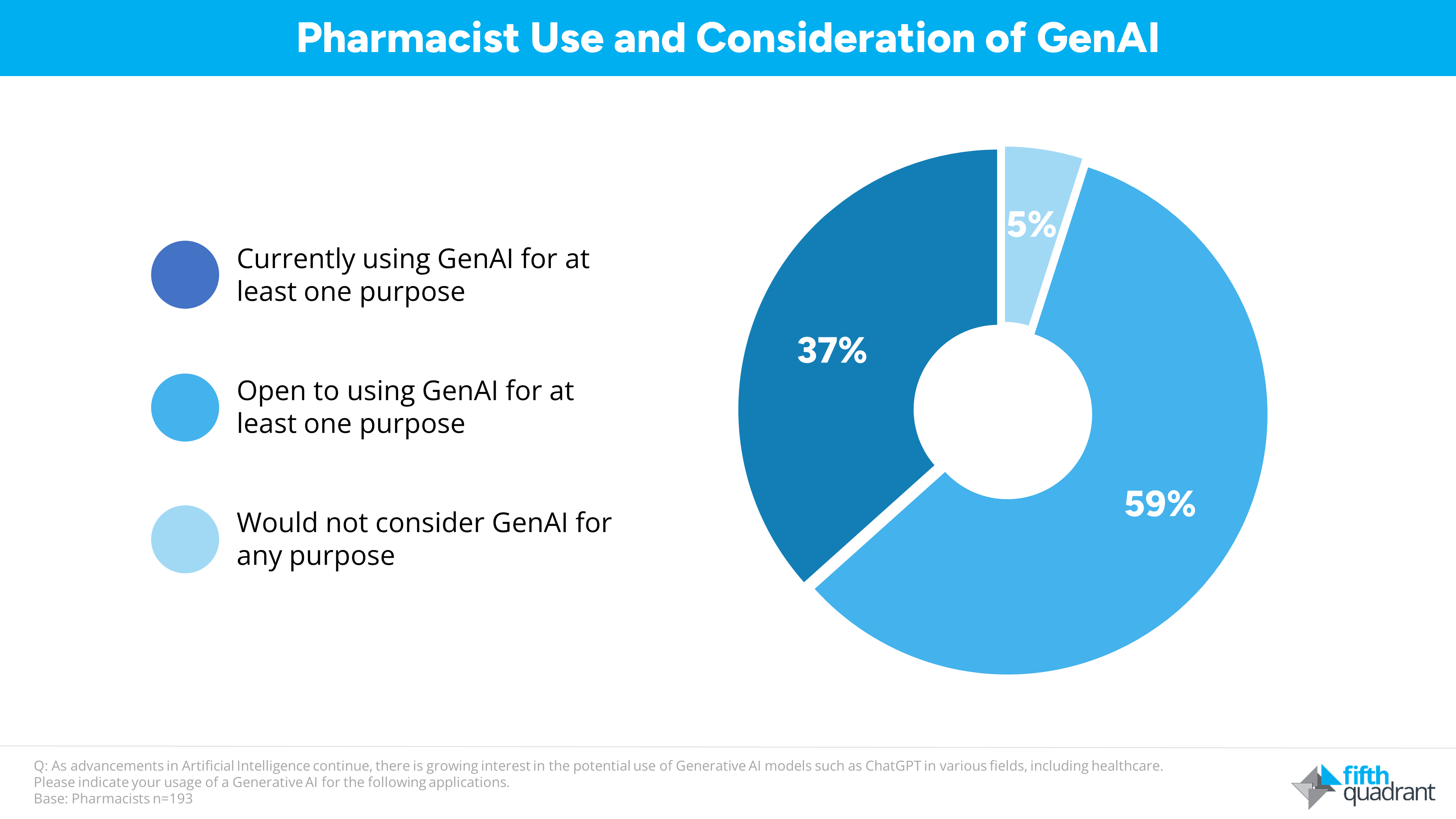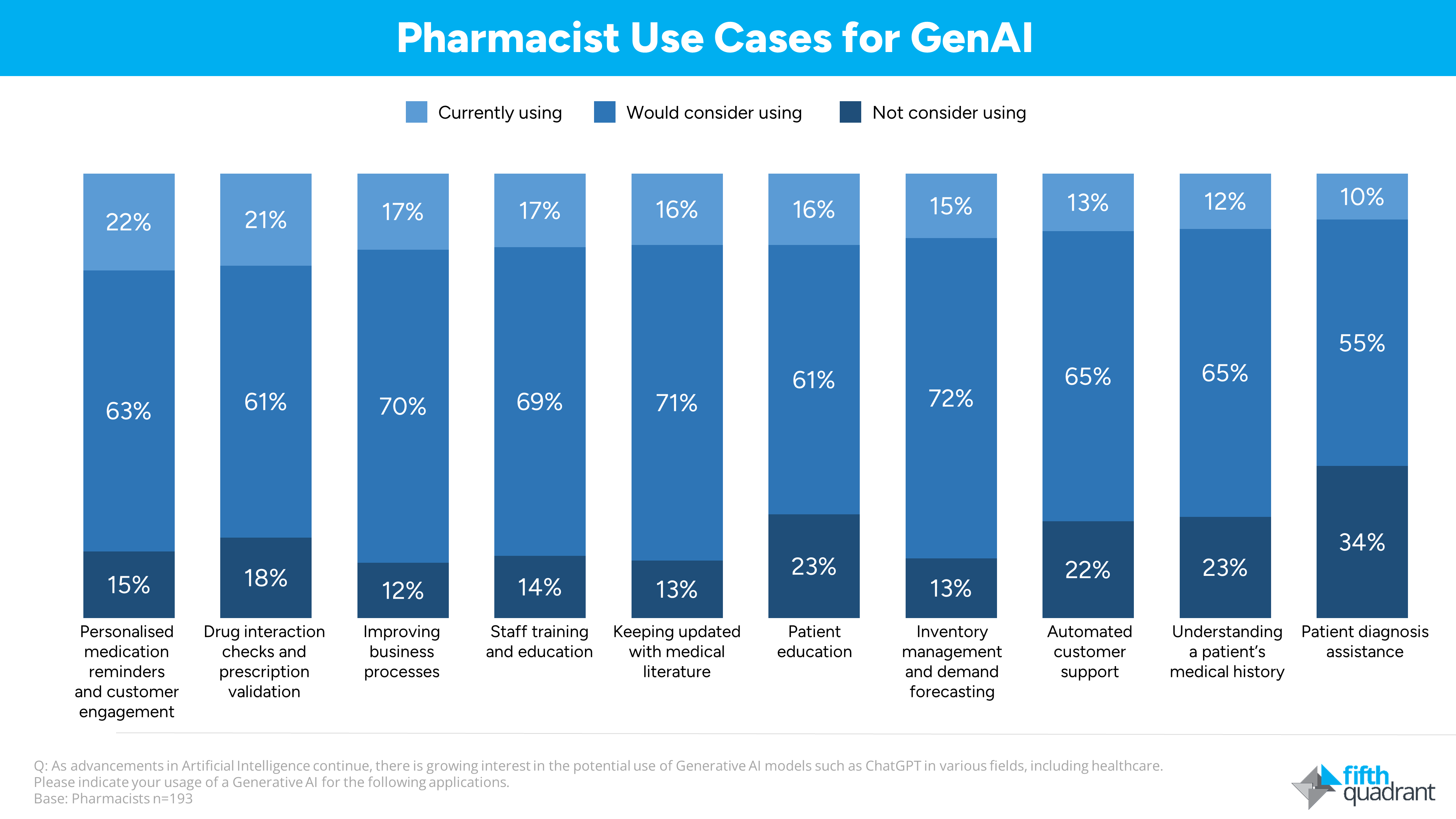Author: Dr Steve Nuttall | Posted On: 25 Jan 2024
Generative AI (GenAI) is poised to revolutionise the healthcare sector. It has the potential to improve diagnostic accuracy, increase healthcare efficiency, and reduce drug development costs. Partnerships with big tech companies, such as Huma’s collaboration with Google and Mayo Clinic’s with Google Cloud, are examples of how healthcare ventures are harnessing GenAI to manage chronic diseases and improve clinical workflows.
we surveyed 193 Australian pharmacists
In this context, Fifth Quadrant undertook a survey of 193 Australian pharmacists to understand their attitudes and use of GenAI models such as ChatGPT and Bard in their pharmacy.
The key takeaway
A substantial portion of Australian pharmacists (37%) are already using GenAI for at least one purpose in the pharmacy, and an even larger group (59%) is open to using it. This indicates a significant openness within the sector towards adopting new technologies. There is still a small segment (5%) that remains sceptical about its use for any purpose, which underscores the need for ongoing education and evidence of GenAI’s benefits.

use cases for Generative AI in pharmacy
When looking at specific uses of GenAI, it is noteworthy that the highest reported current usage is for personalised medication reminders and patient/customer engagement (22%), which suggests that pharmacists are leveraging AI to enhance patient care and streamline communication. Drug interaction checks and prescription validation also see similar levels of current usage (21%), reflecting GenAI’s role in improving patient safety.
Despite the apparent benefits, the most reluctance is observed in patient/customer diagnosis assistance, where 34% would not consider using GenAI. This could stem from ethical concerns about the accuracy of AI in diagnosis and the potential consequences of errors.

The opportunities GenAI presents are vast. With 70% of respondents open to using it to improve business processes and workflows and 69% in staff training and education, GenAI promises not only to enhance patient care but also to improve operational efficiency and staff competency. This indicates a move towards more integrated and sophisticated healthcare systems where routine tasks may be automated, allowing pharmacists and staff to focus on more critical duties.
ethics and regulation
However, the adoption of GenAI is not without challenges. The ethical implications of using GenAI in healthcare are complex and multifaceted. Privacy concerns are paramount, as GenAI systems require access to large quantities of sensitive patient data. The risk of bias in GenAI models is also significant, as they must be trained on diverse and unbiased datasets to prevent skewed outcomes.
Moreover, regulatory compliance is a significant hurdle, with different regions developing varying frameworks for AI use in healthcare. The EU is setting strict requirements for high-risk AI systems, while the US is leaning towards self-regulation with oversight. The UK and China are also creating their regulations, underscoring the need for global harmonisation to ensure safe and effective GenAI deployment.
conclusion
While the survey results indicate a positive trend towards the acceptance and use of GenAI in the pharmacy sector, there is a need for addressing ethical and regulatory challenges proactively. The potential of GenAI to transform healthcare is clear, but it must be harnessed responsibly, ensuring patient safety, data privacy, and equitable access to the benefits of this burgeoning technology.
The Fifth Quadrant team is highly experienced in conducting healthcare and technology market research. To learn more about our capabilities or if you have a brief to share, please get in touch
Posted in Healthcare, QN, Technology & Telco, TL

